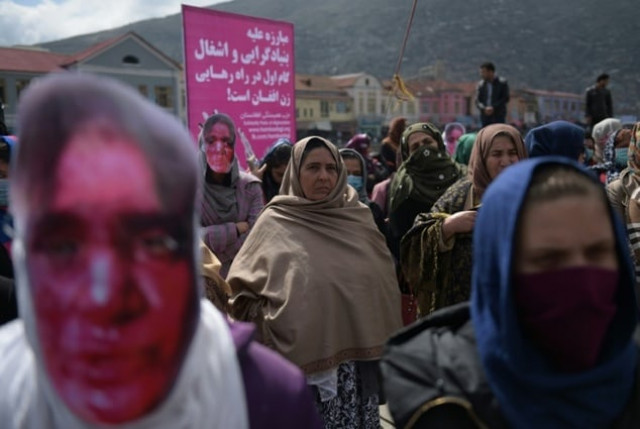Protesters mark one year since mob killing of Afghan woman
The mob killing of the 27-year-old woman known as Farkhunda in broad daylight last March triggered nationwide protests

Afghan activists protest in Kabul on March 17, 2016, demanding justice for a woman savagely killed after being falsely accused of blasphemy. PHOTO: AFP
The mob killing of the 27-year-old woman known as Farkhunda in broad daylight last March triggered angry nationwide protests and drew global attention to the treatment of Afghan women.
Protesters, some with fake blood on their faces, chanted "Justice for Farkhunda!" on the banks of Kabul River where the frenzied mob turned on her.
"The murder of Farkhunda touched us all. It was an unforgettable crime against humanity," Laila Qarayi, a women rights activist.
Al Qaeda in Yemen stones woman to death for adultery: witnesses
Street plays reenacted her grisly death, symbolising public anger over a Supreme Court ruling last week that upheld reduced sentences for the men convicted of her murder.
The court vacated the death penalty in four cases, reduced prison terms to 20 years in three others and 10 years in the fourth.
It also cut the sentences of nine other defendants.
"It is a matter of great shame for our political and justice systems that justice was not delivered in this case," said Kabul University lecturer Saifuddin Saihoon.
A spokesperson for Afghan President Ashraf Ghani told AFP that the country's attorney general has been "instructed to make justice for Farkhunda his top priority and review the case".
But when contacted by AFP, a spokesperson for the attorney general said they had not received instructions from the president for any review.
Farkhunda was attacked on the banks of the Kabul River after an amulet seller, whom she had reportedly castigated for peddling superstition, falsely accused her of burning a copy of the Koran.
Her case has become a symbol of the endemic violence that women face in Afghanistan, despite reforms since the hardline Taliban regime fell in 2001.
The backlash highlighted the angst of a post-Taliban generation in Afghanistan -- where nearly two-thirds of the population is under 25 -- that is often torn between conservatism and modernity as the country rebuilds after decades of war.



















COMMENTS
Comments are moderated and generally will be posted if they are on-topic and not abusive.
For more information, please see our Comments FAQ